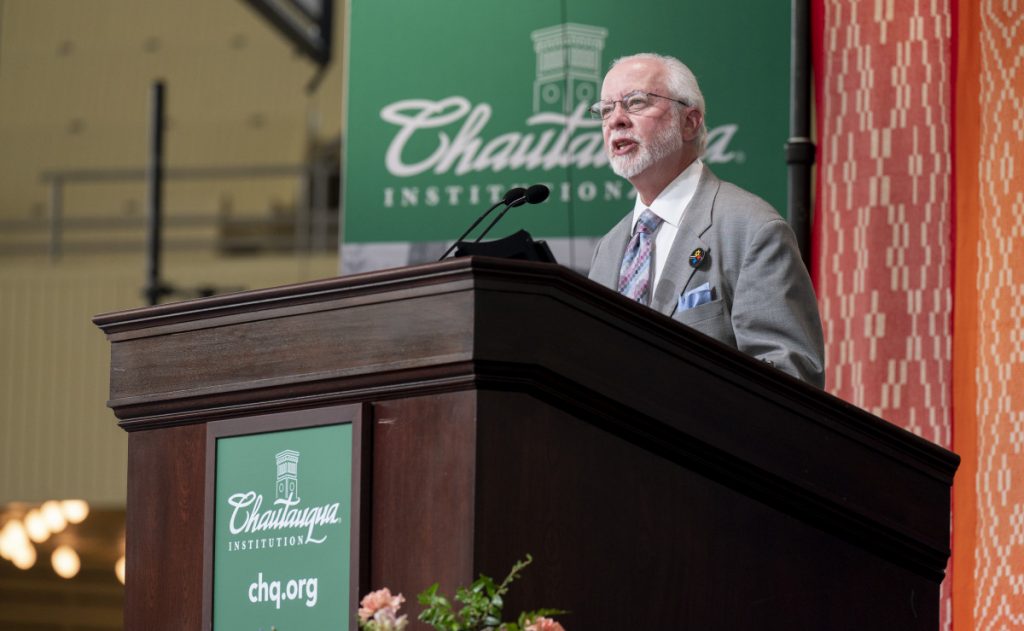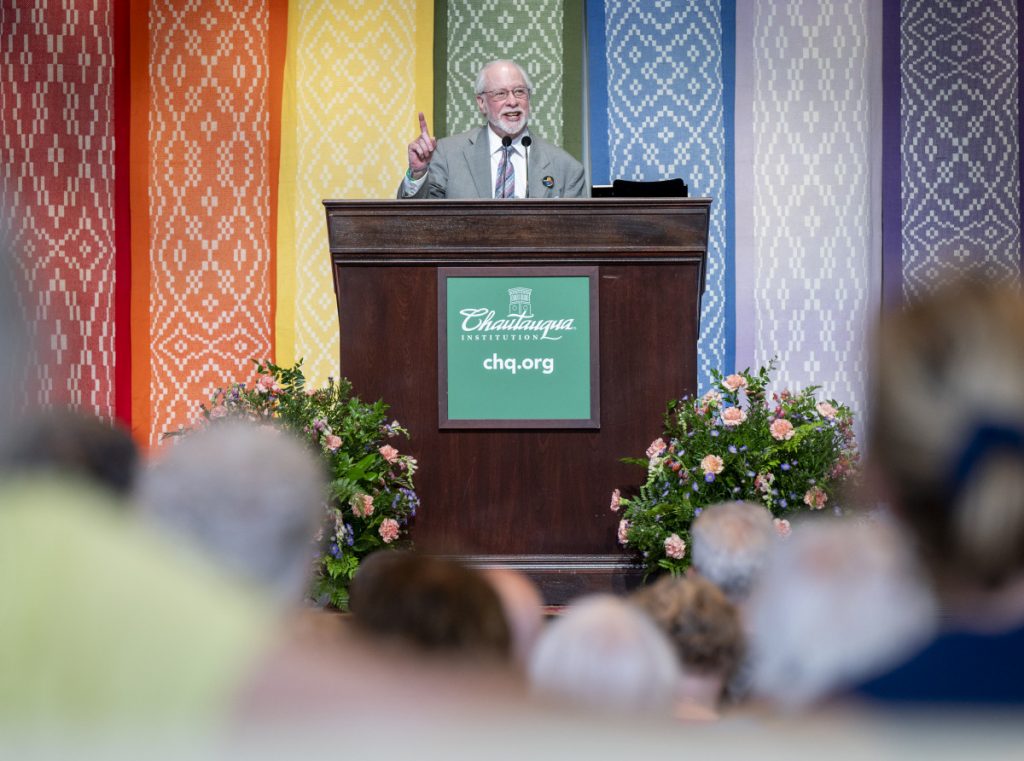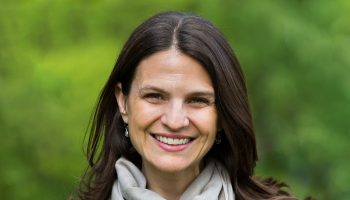MAX ZAMBRANO – STAFF WRITER

Fr. O’Connor was a beloved priest with the exception of his poor oratorical skills, said Rabbi Hazzan Jeffrey Myers.
At the end of one summer, he went to a two-week retreat in order to better his skills. At the very first sermon, a well-known priest said he had spent the best years of his life in the arms of another woman, drawing stunned faces and gasps from the crowd.
He then said it was his mother, drawing a laugh, and O’Connor knew he needed to remember that joke.
When he returned to his church, he opened with the same joke, except he had forgotten the punch line. As seconds ticked, the crowd’s collective jaw stayed on the floor as O’Connor blurted out, “But I can’t remember who she was!”
Myers said O’Connor never preached again, and that he was not resilient.
This was how Myers opened Week Nine’s Interfaith Lecture Series, themed “Resilience.” His lecture, titled “A Ticket to Ride: The Roller Coaster of Resilience,” at 1 p.m. Aug. 23 in the Amphitheater, was the first of three Interfaith Lectures in this final week of the season.
From that story, Myers turned to acknowledge that over the summer, he’s noticed two books related to trauma and resiliency have hit the New York Times Book Review’s top 10.
“Apparently, it’s a big subject now,” he said. “But what is trauma? And what is resiliency? If there is anyone in the United States who has experienced both, I’m certainly one of the people.”
Before explaining further, Myers emphasized that he was not a mental health professional, and that his observations are from what he’s learned from professionals and those who have experienced both trauma and resiliency. He acknowledged that everyone experiences trauma at some point in life. Some traumas are minor, like breaking a bone. If one breaks a bone again later in life, they are more equipped to deal with it because they’ve gathered experience and tools to deal with it. He also compared it to a COVID-19 inoculation — it prepares the body for fighting the virus, he said.
Resiliency then comes from one’s ability to cope with trauma, he said.
Myers himself experienced trauma and resiliency in a high-profile, severe way. On Oct. 27, 2018, when a shooter killed 11 people at the Tree of Life synagogue in Pittsburgh, Myers was leading the Shabbat services.
“It will soon be three years since the massacre, and I continue to shake my head in disbelief at the continuous events that revolve around me, with me and through me,” he said.
He’s managed to get through survivor’s guilt, counseling the families, and the onslaught of world media through the support of his family, friends, congregation and mental health professionals, he said.
“I see no stigma about that,” he said. “As I recognized early on, this was too traumatic for me to manage alone. If you have a heart problem, you see a cardiologist. If you have a skin problem, you see a dermatologist. If you suffer trauma, you see a mental health professional.”
As everyone suffers trauma, so too is everyone resilient, he said. He pulled out a large rubber band to demonstrate.
“My stretching this rubber band is exactly what trauma is — to stretch beyond the norm,” he said. “We revert back to what we were before the stretch, which is resilience. Place this rubber band in the freezer for several hours, and then try to stretch it. It will not stretch far, if at all. In fact, it might break.”
Typically, the rubber band can stretch and return, which is resilience, he said. When it’s frozen, or one doesn’t have the right skills or tools to handle the trauma, defrosting is necessary, which may be seeking out professional help.
Prior experiences can help cope with trauma, but sometimes not, he said. Sometimes, the rubber band snaps.
“I’m grateful that up until now my rubber band has not snapped,” he said. “It has certainly been stretched farther than I thought possible. And, sometimes, it takes a while for it to resume its original shape.”
Some days are great until a sensory input sends it tumbling, he said. For him, it can be another mass shooting, but of the 411 mass shootings in the United States this year, as of July 31, not every single one retraumatized him, he said.

“Sometimes, one can,” he said. “I do not watch the news of a mass shooting as the activity brings me back to Oct. 27, 2018, and it can be draining to relive that day over and over.”
When he learns of a mass shooting, it can take his rubber band several hours to return to its normal shape, he said, but he credits this quick restorative period to his mental health professionals and tools he’s acquired — though he cautioned that what works for him may not work for others.
“Part of my resilience is the determination that I will not permit the shooter at Tree of Life to claim another victim,” he said.
Instead, since that day, he’s been on a new mission to remove hate speech from society, he said.
A couple weeks after the Tree of Life shooting, Myers was set to give a speech in front of a huge crowd, which included celebrities. He had no idea what to say even as he walked up on the stage, so he prayed for what to say.
In his speech, he noted how everyone was taught of four-letter words that were obscenities, and he said “hate” should be added to the list.
“When people use this word, ultimately their language is emotional and leads to violent actions, such as a massacre in my synagogue,” he said. “If you just don’t like something, then say, ‘I don’t like it!’ ”
He understands that this act will not solve the country’s or world’s problems, but hopes it is a start.
“Part of resilience is post-traumatic growth,” he said. “The growth of new shoots from the tree that was severely damaged on Oct. 27; the ability to discover hidden skills and abilities that created a newer version of the previous me.”
Myers said people have much more in common than divisions, as leaders of all faiths and organizations helped him post-Oct. 27, although he had only moved to Pittsburgh a few months prior.
Trauma can appear at unwelcome and unexpected times, he said, and resilience has taught him how to let trauma know it is unwelcome. No matter how many times it’s kicked away, it will crawl back again, he said.
The shooting and resilience, in some ways, helped Myers prepare for this pandemic, he said. As the Tree of Life synagogue was no longer a prayerful place, he said, citing the prophet Ezekiel, congregants moved to another nearby synagogue.
“We were a displaced congregation, and despite how warmly we were welcome, everyone desperately wanted to go to their home synagogue, which we could not do,” he said.
Then, when the risk of COVID-19 forced everyone online, everyone was displaced again. He reaffirmed to his congregation that they had existed since 1864, and the Jewish community was over 4,000 years old.
Part of resilience is post-traumatic growth. The growth of new shoots from the tree that was severely damaged on Oct. 27; the ability to discover hidden skills and abilities that created a newer version of the previous me.
—Rabbi Hazzan Jeffrey Myers
Rabbi And Cantor,
Tree Of Life Synagogue, Pittsburgh
“Judaism is not about a location,” he said. “It is about what is in your heart that binds us together.”
In his livestreams, he could see his congregants, but he noticed an erupting line of hearts shooting up from the bottom of the screen. They lined up perfectly with the candles behind him, he said.
“I had to take a breath and pause and utter a ‘Thank you, God,’ for God’s divine guidance,” he said. “It was at that moment I knew that, together, we would get through our second displacement, for I saw my congregation’s resiliency right there on the computer screen.”
Either one will find resiliency or it will find someone, he said. Psalms helped show him resiliency in the days following Oct. 27 when, for the first time in his life, Myers lost his prayer voice.
He was at another school where his wife teaches, and as they stood to recite prayers, Myers couldn’t find words to say out loud. He cried to God for help, and God’s answer was Psalms, he said.
Myers read through all 150 later that day, and Psalm 121 stood out to him, which shows a recognition that God is the one who can provide help, and one who trusts in God can trust he will be protected.
He’s recited this poem in Hebrew every morning since then.
“It gives me hope and confidence for the day,” he said.
Soon, Myers included Psalms into the conclusion of Friday evening services, initially using Psalm 27, which he recites at the beginning of Rosh Hashanah and in the middle of Sukkot. He read its final two verses to the Amp.
“Yet I have faith that I should truly see God’s goodness in the land of the living. Hope in God; be strong, take courage and hope in God,” he read.
He recognized these psalms, written by King David 3,000 years ago, hold eternal power against trauma.
“For me, King David’s resilience has become my resilience,” he said. “His words encourage me that even during difficult times, I can endure. I can move past it, and I do. And the thing about resilience is once you’ve experienced it, you are poised for further moments of resilience.”
Myers does have days where he cannot fight against trauma, he said.
On April 27, 2019, one person was killed in a synagogue shooting in a San Diego suburb.
“I did not have the words to describe my response at that moment, as I do not have the words to describe my response right now,” he said. “But to say it was bad was a severe understatement. My wife quickly turned off the TV, and suffice to say, I was an inconsolable wreck for the remainder of the evening.”
He thanked God there was only one person killed, as he knew there could have been more, he said. The shooter in San Diego was inspired by the Pittsburgh shooter, and Myers had no way of comprehending that.
“Fortunately, with time and care, I worked my way through it and moved forward,” he said. “I share this with you because there will be times in our lives when we are just not very resilient, and to reassure you that it is OK. … The most important lesson is to identify the trauma and to get the proper help for it.”
He’s not had another experience like that yet, but he knows it is possible. Myers surprises himself with his own resiliency, but said everyone has the same ability.
“It is in our DNA; evolving over time to face the challenges of being a human in a world that sometimes lacks humanity,” he said. “The fact that you are seated here today asserts your resilience, for a pandemic can most certainly challenge your resilience.”
Myers wasn’t sure why God wanted him in Pittsburgh after spending his life on the east coast, but now, he said, he understands.
“I truly believe that God wanted me in Pittsburgh to help my community pick up the pieces afterwards,” he said. “God did not call the shooter to Tree of Life. The shooter made that decision on his own. I chose to stay. Sometimes, my wife will ask me why I answered the call. I answered the call because when God calls, you don’t send God to voicemail.”
When Tree of Life reopens, it will be a model of resilience to the world, he said.
“Our resilience will help other communities to find their own resilience, because that is what it means to be a member of the human race,” he said.
Resilience opens a new version of ourselves, he said. He read a quote from Bram Stoker’s Dracula that referenced humans’ resiliency and that trauma can be removed by any way, including death.
Myers said death was more exaggerated than he preferred, but agreed that removing trauma through resilience is part of humans’ DNA, and that people come away with hope and enjoyment. As a person experiences this over and over, they grow in confidence, he said.
“Success breeds success,” he said. “Resilience breeds more resilience.”
He closed with a critique on the celebration of life. When someone is born, there are celebrations, but that is not as common with death. Although he believes people should continue to celebrate births, people should celebrate deaths to a higher extent. He compared it to a ship at sea, where humans face storms and stiff waters, in addition to calm waters and sunny skies. When a ship returns from sea, it should be celebrated more than when it departed because it survived the journey.
“As grand as our birth is, our pending end should be even grander — because we made the sacred journey, and that should be celebrated,” he said. “And we did so because we are resilient.”




